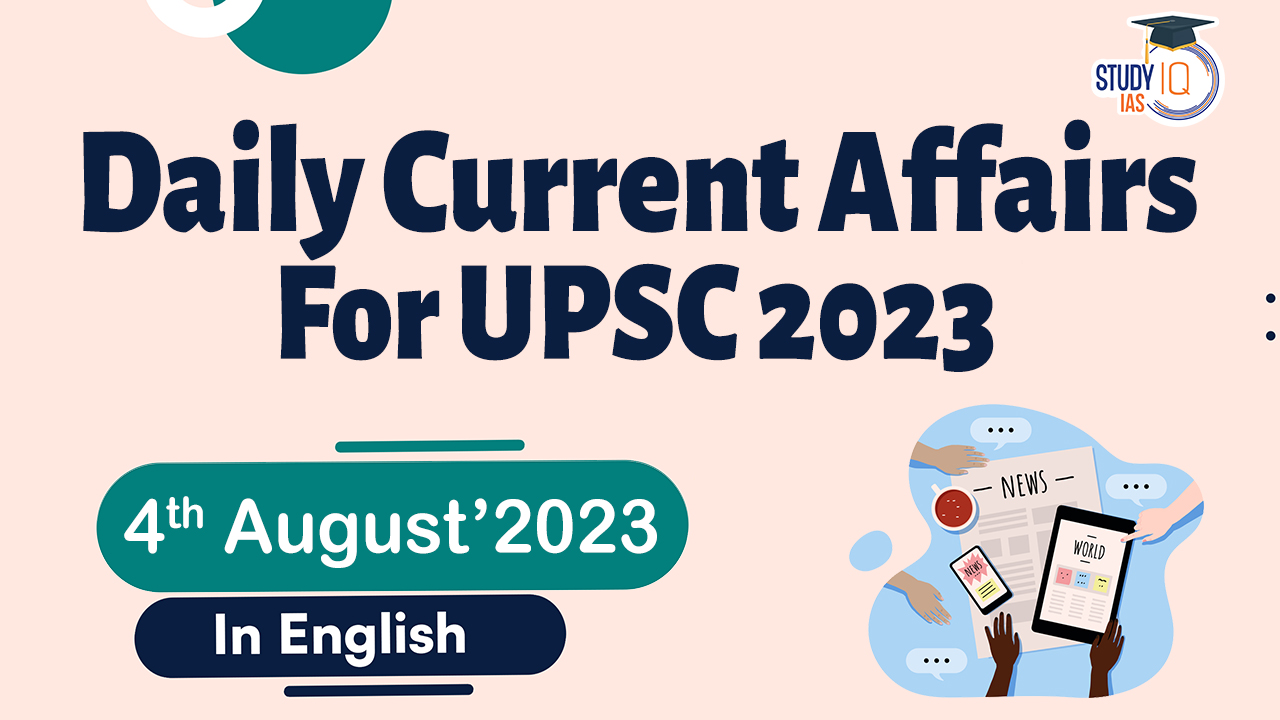Daily Current Affairs for UPSC 2023
Q) Which of the following statements is not correct about Foreign Contribution Regulation Act (FCRA)?
- It was enacted during an Independent India
- It was suspended during the Emergency in 1976
- It regulates foreign donations to individuals and associations
- Once granted, FCRA registration is valid for five years.
Daily Current Affairs for UPSC – 3 August April 2023
Explanation:
The Ministry of Home Affairs (MHA) has withdrawn the permit under the Foreign Contribution Regulation Act (FCRA) for U.K.-based NGO Save The Children’s Indian offshoot, Bal Raksha Bharat.
- Option (2) is the correct answer: Foreign Contribution Regulation Act was enacted during the Emergency in 1976 amid apprehensions that foreign powers were interfering in India’s affairs by pumping money into the country through independent organisations. It aims to regulate foreign donations to individuals and associations so that they function in a manner consistent with the values of a sovereign democratic republic. The FCRA requires every person or NGO seeking to receive foreign donations to be:
- Registered under the Act
- To open a bank account for the receipt of foreign funds in the State Bank of India, Delhi.
- To utilise those funds only for the purpose for which they have been received and as stipulated in the Act.
Once granted, FCRA registration is valid for five years. NGOs are expected to apply for renewal within six months of the date of expiry of registration. Registration can be cancelled if an inquiry finds a false statement in the application. Once the registration of an NGO is cancelled, it is not eligible for re-registration for three years. The MHA also has the power to suspend an NGO’s registration for 180 days pending inquiry and can freeze its funds
Q) Consider the following statements:
- The backward classes are not defined under the Constitution of India.
- Article 340 empowers the Governor to constitute a committee to investigate the conditions of backward classes in their respective State.
- Rohini Commission was set up in 2017 to identify backward classes other than the SCs and STs at the national level in India.
How many of the statements given above are correct?
- Only one
- Only two
- Only three
- None
Explanation:
The long-awaited report of the Rohini commission that was set up to examine the sub-categorisation of Other Backward Classes (OBCs) was submitted to the President recently.
- Statement 1 is correct but Statement 2 is incorrect: Other Backward Classes (OBCs) in India comprise the so called ‘non-untouchable’, lower and intermediary castes who were traditionally engaged in agriculture, animal husbandry and handicrafts services. The backward classes are not defined under the Constitution of India. However, as per the Indian Constitution, they are socially and educationally backward classes. Article 340 gives the President the power to constitute a committee to investigate the conditions of backward classes in India and recommend measures for their welfare, upliftment, and development.
- Statement 3 is incorrect: The Kalelkar Commission in 1953, was set up for the first time to identify backward classes other than the Scheduled Castes (SCs) and Scheduled Tribes (STs) at the National Level. The Commission submitted its report in 1956 and recommended that caste is an important measure of backwardness. Whereas, the Rohini commission was set put in 2017 by the Union government, to examine the sub-categorisation of Other Backward Classes (OBCs) in India. The need for sub-categorization of OBCs arises from the desire to ensure equitable distribution of the reservation benefits among different OBC communities.
Q) Match the following pairs:
| GI Tags | States | |
| 1. | Jalesar Dhatu Shilp | : Madhya Pradesh |
| 2. | Mankurad Mango | : Kerala |
| 3. | Kashidakari Craft | : Rajasthan |
| 4. | Bandhej Craft | : Gujarat |
How many of the pairs given above are correct?
- Only one pair
- Only two pairs
- Only three pairs
- All four pairs
Explanation:
Geographical Indications of Goods are defined as that aspect of industrial property which refer to the geographical indication referring to a country or to a place situated as being the country or place of origin of that product.
- Pair 1 is incorrectly matched: Jalesar Dhatu Shilp of Etah district, Uttar Pradesh involves making decorative metal craft and brassware, including ghungrus (anklets) and ghantis (bells). The Thatheras community, residing in the Hathuras locality, is responsible for creating these beautiful metal products.
- Pair 2 is incorrectly matched: An enchanting Mango Variety from Goa, Goa Mankurad Mango, also referred to Goa Alphonso is a delightful mango variety grown in Goa. Due to its sweet taste, juicy pulp, thin skin, and pleasant aroma, it is regarded as one of the finest mango varieties in India. The mango’s name has an interesting historical background. Initially named “malcorada” by the Portuguese, which means ‘poor colored’ it later evolved into “mankurad aamo” (mango) in Konkani.
- Pair 3 is correctly matched: The ‘Bikaner Kashidakari Craft’ in the state of Rajasthan involves fine stitching and mirror-work on cotton, silk, or velvet, primarily for objects related to weddings and gift items. The mirrors are believed to ward off the ‘evil eye’ with their reflective surfaces, and the craft was traditionally done by the Meghwal community in Bikaner and nearby districts.
- Pair 4 is incorrectly matched: Jodhpur Bandhej Craft (Rajasthan) is known for its vibrant and colorful appeal. Bandhej is an ancient Rajasthani art of tying and dyeing textiles. The fabrics used for Bandhej are muslin, silk and voile. Cotton thread is used for tying the fabric.
Q) With reference to Super Conductor, consider the following statements:
- Superconducting power cables can transport electricity with almost no loss.
- Superconducting magnets in Maglev trains allow for frictionless levitation.
- Superconducting magnets in MRI machines create low and fluctuating magnetic fields, which makes them less harmful for medical diagnosis.
Which of the statements give above are correct?
- 1 and 2 only
- 1 and 3 only
- 2 and 3 only
- 1, 2 and 3
Explanation:
South Korean scientists claim to have developed a superconductor material named LK-99 that operates at room temperature, which could have huge implications for science and technology.
- Statements 1 and 2 are correct but Statement 3 is incorrect: Superconductivity refers to a state in which a material offers zero, or near-zero, resistance to electric current. When a material becomes superconducting, it loses all electrical resistance, allowing an electric current to flow through it indefinitely without any loss of energy. Key applications of Super Conductors are as follows:
- Superconducting power cables can transport electricity with almost no loss, significantly reducing energy wastage during long-distance transmission.
- Superconducting magnets in Maglev trains allow for frictionless levitation, enabling high-speed transportation with reduced energy consumption and noise.
- Superconducting magnets are used in MRI machines to create strong and stable magnetic fields, producing detailed images of internal body for medical diagnosis.
- Superconducting magnetic energy storage (SMES) systems can store large amounts of electrical energy for short periods, offering a potential solution for energy grid stabilization and peak power demands.
As of now, superconductivity can be achieved only at very low temperatures i.e., very close to absolute zero which is – 273 degrees Celsius.
Q) Consider the following statements:
- A Financial Bill (I) contains not only any or all the matters mentioned in the Money Bill, but also other matters of general legislation
- A Financial Bill (II) contains provisions involving expenditure from the Consolidated Fund of India but does not include any of the matters mentioned in Article 110
- A Money Bill contains provisions only related to taxation, borrowing of money by the government, expenditure from or receipt to the Consolidated Fund of India.
Which of the statements give above are correct?
- 1 and 2 only
- 1 and 3 only
- 2 and 3 only
- 1, 2 and 3
Explanation:
A Parliamentary Affairs Minister has stated that the Digital Personal Data Protection (DPDP) Bill is a normal Bill and not a Money bill.
- Statements 1 and 2 are correct: A Bill that contains some provisions related to taxation and expenditure, and additionally contains provisions related to any other matter is called a Financial Bill. Therefore, if a Bill merely involves expenditure by the government, and addresses other issues, it will be a financial bill.
- A Financial Bill (I) contains not only any or all the matters mentioned in the Money Bill, but also other matters of general legislation. It is dealt under Article 117 (1) of the Constitution.
- A Financial Bill (II) contains provisions involving expenditure from the Consolidated Fund of India but does not include any of the matters mentioned in Article 110. It is dealt under Article 117 (3) of the Constitution.
- Statement 3 is correct: A Money Bill is also a specific type of Finance Bill, that must deal only with matters specified in Article 110 (1) (a) to (g) of the Constitution of India. A Bill is said to be a Money Bill if it onlycontains provisions related to taxation, borrowing of money by the government, expenditure from or receipt to the Consolidated Fund of India.
Q) Which of the following statements is/are correct?
- Government schools in Punjab have seen a drop in enrollment in the last 5 years.
- The Pratibha Parv initiative is recently launched by the Ministry of Education to improve the quality of education in government schools across India.
Select the correct answer using the code given below:
- 1 only
- 2 only
- Both 1 and 2
- Neither 1 nor 2
Explanation:
- Statements 1 and 2 are incorrect: The state of Madhya Pradesh in India has a large population of children who attend government schools. However, the quality of education in these schools has been a major concern for many years. In 2011, the government of Madhya Pradesh launched the Pratibha Parv initiative in an effort to improve the quality of education in government schools. The Pratibha Parv initiative has been a successful effort to improve the quality of education in government schools in Madhya Pradesh. The initiative has led to increased student attendance, improved academic performance, and increased community involvement. The initiative is a model for other states in India and around the world that are looking for ways to improve the quality of education in government schools.


 Air Pollution in India, Causes, Effects,...
Air Pollution in India, Causes, Effects,...
 Daily Quiz 03 April 2025
Daily Quiz 03 April 2025
 List of National Symbols of India with N...
List of National Symbols of India with N...





















